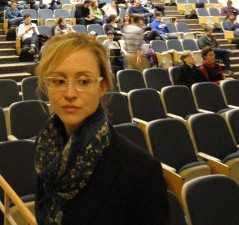(POSTPONED) Dirty Digital Environmental Humanities
From iPhones to eWaste
This talk was originally scheduled for March 14, but the speaker has had to postpone her visit until Fall of 2017 due to unforeseen circumstances. MITH will post the new date for this talk along with the Fall 2017 Digital Dialogues schedule in late summer/early fall. How do we seed digital media study – and the digitally-related humanities writ large – with the deep roots of active sustainability, environmental awareness, and eco action (or activism)? In Greening the Media, Richard Maxwell and Toby Miller rightly note that “a deep ecological materiality has eluded the humanistic knowledge of media technology.” They point out that the majority of contemporary media studies thinking falls into one of two camps, either humanistic or mechanistic: the humanist focuses primarily on affective results of technologies while the mechanistic theorist looks at digital media’s codes and algorithms. Neither tend properly to the dirty environmental effects of our digital technologies, and I argue, by situating the digital as an affective (humanist) or algorithmic (machinic) artifact, both actually perform de-materializing abstractions that perpetuate the neglect of concrete environmental thinking in the field. Though digital thinking is punctuated by terms like ‘wirelessness,’ ‘the Cloud,’ and notions of immateriality, the truth of course is that our digital network has a very real physical footprint, and even our google searches and spam emails have a carbon output. This presentation responds to Maxwell and Miller’s call for a deep ecological materiality by introducing a metabolic relational ontology that orients the digital network and digital media as constitutive parts of today’s bio- and geo-material metabolisms. The digital network of connected things and connective infrastructure—the_ technosphere_, as so called by Environmental Engineer Peter Haff—is now profoundly entangled with Anthropogenic environmental concerns, and digital studies has a role to play in creating new narratives to capture these emerging relations. Indeed, the Anthropocene prompts us to re-story our digital theory so as to include its full implications—from mineral mining to e-waste and all the energy use, labor exploitation, and pollution in between—in the digital stories we tell. This presentation proposes a method for moving media theory from a praxis grounded in computation to one fully rooted in the earth. It explores how we might infuse digital humanities practice, be it artistic or more research based, with a necessary environmental sensitivity in order to enact deeper engagements with our digital metabolic entanglements.
Speakers

Amanda Starling Gould, PhD is the Digital Humanities Specialist / Special Projects Coordinator for the Franklin Humanities Institute (FHI) at Duke University. She teaches publicly-engaged environmental humanities courses, researches EcoDH, collaborates on regional public humanities initiatives, and consults on digital humanities programming, projects and pedagogies.

